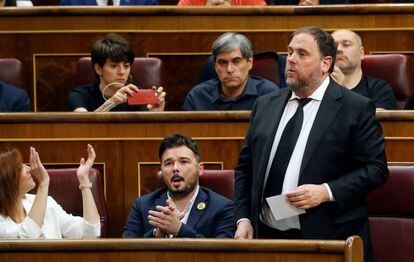Catalan separatist denied permission to take seat in European Parliament
Supreme Court said that letting Oriol Junqueras leave prison before a verdict is handed down in the recently concluded trial poses a risk, as it would mean letting him go to Brussels


The Spanish Supreme Court has denied the leader of the Catalan Republican Left (ERC), Oriol Junqueras, permission to leave prison to attend a ceremony at the National Electoral Commission (JEC) on Monday, June 17, where he would be sworn in as a member of European parliament (MEP).
The former deputy premier of Catalonia, who is one of nine separatist leaders currently being held in preventive custody in Soto del Real prison in Madrid for their role in the 2017 Catalan independence drive, won a seat in the European Parliament at the May 26 vote as the lead candidate of Ahora Repúblicas (Republics Now), the electoral alliance representing the ERC, Basque far-left nationalist party EH Bildu and the Galician Nationalist Bloc (BNG).
The Supreme Court’s decision means Junqueras will not be able to receive immunity from the European Parliament
But the Supreme Court’s decision means Junqueras will not be able to assume his position as an MEP. According to the court, if Junqueras were granted permission to attend the JEC session in Madrid, he would also have to be allowed to attend the swearing-in ceremony at the European Parliament in Brussels on July 2.
This journey would cause “irreversible harm” to the deliberations in the Supreme Court trial against Catalan separatist leaders, the ruling stated. The hearings ended on Wednesday and a verdict is expected within four months. Junqueras faces up to 25 years in prison if found guilty of rebellion and misuse of public funds for his involvement in the illegal referendum on Catalan independence on October 1, 2017 and the unilateral declaration of independence that was passed in the regional parliament a few weeks later.
The Supreme Court’s decision to deny Junqueras permission to attend the JEC session means that he will not be able to immediately serve as an MEP or to receive immunity from the European Parliament. Up until now, the Supreme Court had chosen to respect the right of representation of the pro-independence leaders in preventive custody. When five of the separatists – including Junqueras – were elected to Congress and the Senate at the April 28 general election, the court granted them permission to leave prison to take their seats, although it later recommended that they be suspended from office.
The court said that allowing Junqueras to travel to Brussels would lead to “a loss of jurisdictional control”
But in this case, the Supreme Court says that allowing Junqueras to travel to Brussels to take his seat in the European Parliament would lead to “a loss of jurisdictional control” over him. Brussels is also the city where ousted Catalan premier Carles Puigdemont is living in self-imposed exile after fleeing Spain to avoid arrest after the unilateral independence declaration of October 2017.
Spain’s top court said it “considered” all options in an effort to protect the interests of all involved. In its statement, the court said the decision to deny Junqueras permission to leave prison did not “irreversibly” affect his right to take office in the European Parliament, but was rather a “temporary postponement” until all the obstacles to his investiture could be addressed.
The Supreme Court’s decision reflects the position of the public prosecutor, which warned that allowing Junqueras to be sworn in as MEP would lead to “absolutely unreasonable interferences” in the legal proceedings against the ERC leader. According to prosecutors, if Junqueras were allowed to take his seat in the European Parliament, he would automatically receive immunity. This would mean the Supreme Court would need to ask Brussels for permission to continue the case against him, which would potentially push back the verdict of the trial. “The verdict cannot be put on hold on any condition,” the prosecutors warned.
However, the Solicitor General’s Office, which answers directly to the government, argued that the previous rulings from the Supreme Court have established that the separatists in preventive custody have the right to assume office, because failing to do so violates their right to participation.
English version by Melissa Kitson.












































